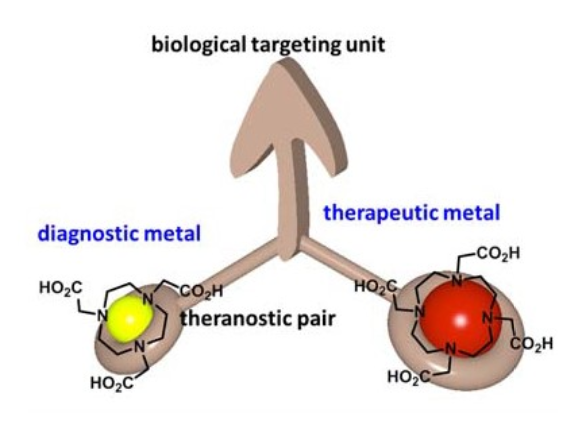Project annotation:
Selective metal complexation by macrocyclic ligands as a way to dinuclear complexes for molecular imaging Medicinal imaging techniques as Magnetic Resonance Imaging (MRI), nuclear techniques (PET or SPECT) or op- tical imaging (fluorescence) require contrast agents (CAs, also termed as tracers or probes). They are often based on metal complexes those physico-chemical properties are tuneable by a ligand design. Role of imaging techniques, and imaging agents, is increasing with arrival of personalized medicine (a treatment tailored for a particular patient).
One approach to bimodal probes (i.e. for two imaging modalities) and/or theranostic agents (i.e. combining diagno- sis and therapy) is based on two different metal ions combined into one molecule The goal can be accomplished by two chelators each being selective for a particular metal ion. As metal ions in their “free” form are generally toxic for potential in-vivo use, they must be bound in stable complexes and polyazamacrocyclic chelators (e.g. DOTA or NOTA) are preferred. In the Project, chelator designed through a suitable choice of the azamacrocycle and coordinat- ing pendant arms for a selective complexation of metal ions will be prepared. Such ditopic ligands will enable mutual combination of metal ion pairs as e.g. Ln(III)-Cu(II), Ln(III)-Ga(III) or two different Ln(III) ions. The research will involve chelator design and synthesis, followed by investigation of their coordination properties. Ligand/complex structures in solution and the solid-state (spectroscopies, X-ray), thermodynamic (potentiometry) and kinetic properties of the complexes (which are decisive for the chelator selectivity) will be studied. First, individual ligand(s) will be studied to get chelators with suitable properties. Such ligands will be conjugated to get desired ditopic chelators. Through collaborations, their imaging and/or theranostic potential (in-vitro/in-vivo) will be tested.
We offer work in team with a long time experience in the multidisciplinary area of chemistry. We have established collaborations in Europe The fellowship offered by the Charles University will cover well living expenses in Prague.
More information about our research at http://web.natur.cuni.cz/anorchem/koordchem/en

Eliglibility criteria:
Selection process:
Selection will be based on the relevance of candidates’ professional interests and experience, and excellence in research achievements.
Position duration, starting date and remuneration:
The position duration is 24 months, starting on January 1, 2021 and ending December 31, 2023. Standard gross monthly salary is approx. 2 400 € including health insurance and social insurance coverage. The job status is full-time - 40 hours per week.
Required application materials:
How to submit materials:
Please send email with the required application materials to the project supervisor:
Prof. Petr Hermann
Group of Coordination and Bioinorganic Chemistry
Department of Inorganic Chemisty Faculty of Science, Charles University
✉ Hlavova 2030, 128 43 Prague 2
e-mail: petrh@natur.cuni.cz
☎ +420-22195-1263
Application deadline:
The application deadline is July 25, 2020. Succesfull candidates will be informed by October 10, 2020.